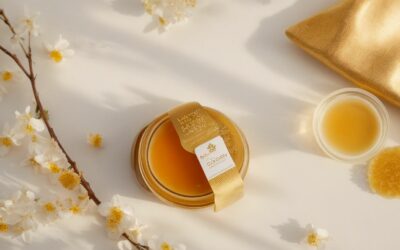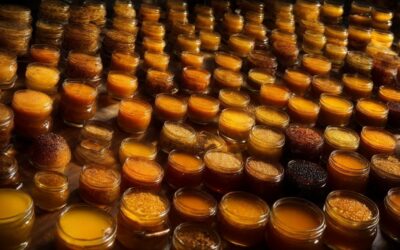Welcome to the world of coffee and honey where a simple cup of joe can be transformed into a nourishing and flavorful experience. But have you ever considered adding Manuka honey to your coffee?
In this article, we’ll explore the benefits of this unique honey and why you should start adding it to your daily cup of coffee for a healthier and tastier morning routine. Don’t miss out on this game-changing coffee addiction.
Why Should You Add Manuka Honey to Your Coffee?
If you’re a coffee lover, then you know the joy of finding new and delicious ways to enhance your daily cup of joe.
One of the latest trends is adding manuka honey to coffee, and for good reason. In this section, we will discuss the various benefits of incorporating manuka honey into your coffee routine.
From increased energy and focus to improved digestion and inflammation-fighting properties, you’ll discover why this sweet addition is a must-try for any coffee enthusiast. So grab your mug and let’s dive in to the world of coffee with honey!
1. Boosts Energy and Focus
Adding Manuka honey to your coffee can provide a natural boost of energy and focus. Here are some steps to incorporate it into your daily routine:
- Choose high-quality Manuka honey with a UMF rating of 10+ for maximum benefits.
- Brew your coffee as usual and let it cool slightly.
- Add 1-2 teaspoons of Manuka honey to your coffee and stir until dissolved.
- Enjoy your coffee with the added benefits of increased energy and improved focus.
2. Provides Antioxidants and Nutrients
Including Manuka honey in your coffee provides a range of antioxidants and nutrients that can greatly benefit your health. If you’re interested in incorporating Manuka honey into your coffee, follow these simple steps:
- Begin by brewing a fresh cup of coffee according to your personal preference.
- Once the coffee is ready, allow it to cool for a few minutes to ensure the beneficial properties of the honey are not damaged.
- Add a teaspoon of high-quality Manuka honey to your cup of coffee.
- Stir the honey into the coffee until it is completely dissolved.
- Enjoy your coffee, now enriched with antioxidants and nutrients from the Manuka honey.
By following these steps, you can easily enhance your coffee experience while reaping the nutritional benefits of Manuka honey.
3. Supports Digestive Health
Adding manuka honey to your coffee can provide support for digestive health in the following ways:
- Boosts gut health: Manuka honey contains prebiotics that nourish beneficial gut bacteria, promoting a healthy gut microbiome.
- Relieves digestive discomfort: The anti-inflammatory properties of manuka honey can soothe an irritated stomach and alleviate symptoms such as bloating and indigestion.
- Aids in digestion: The enzymes present in manuka honey, such as amylase and invertase, assist in breaking down carbohydrates and proteins, aiding digestion and supporting digestive health.
- Helps with acid reflux: Manuka honey’s natural acidity-balancing properties may help reduce acid reflux symptoms, providing relief for those with gastroesophageal reflux disease (GERD).
4. Helps Fight Inflammation
Incorporating Manuka Honey into your coffee can help combat inflammation thanks to its anti-inflammatory properties. This natural honey contains compounds like methylglyoxal (MGO) that have been scientifically proven to reduce inflammation in the body.
By simply adding a spoonful of Manuka Honey to your coffee, you can not only enjoy its natural sweetness but also reap the benefits of reducing inflammation.
To fully experience these benefits, make sure to choose Manuka Honey with a high UMF and MGO rating, ensuring its quality and effectiveness. Making Manuka Honey a regular part of your coffee routine can be a delicious and health-enhancing choice.
How to Use Manuka Honey in Your Coffee?
Adding honey to your coffee is a delicious and healthy way to elevate your daily caffeine fix. But have you tried using Manuka honey in your coffee? This potent and nutrient-rich honey from New Zealand has numerous benefits that can enhance your coffee experience.
In this section, we will discuss three different ways to incorporate Manuka honey into your coffee routine – through a simple stir-in method, a nourishing face mask, and an invigorating body scrub. Get ready to take your coffee game to the next level.
1. Simple Stir-in Method
For a simple stir-in method to add Manuka honey to your coffee, follow these steps:
- Brew your coffee as usual.
- Choose high-quality Manuka honey with a UMF or MGO rating.
- Pour your desired amount of coffee into a cup.
- Add a teaspoon or more of Manuka honey to the coffee.
- Stir well until the honey is fully dissolved.
Fact: Manuka honey is derived from the nectar of the Manuka tree flowers and is known for its unique antibacterial properties.
2. Honey and Coffee Face Mask
To make a honey and coffee face mask, simply follow these steps:
- In a bowl, mix 2 tablespoons of honey and 1 tablespoon of finely ground coffee.
- Apply the mixture to your clean face, being careful to avoid the eye area.
- Using circular motions, gently massage the mask into your skin for a few minutes.
- Allow the mask to sit for 15-20 minutes, allowing the ingredients to work their magic.
- Rinse off the mask with warm water and gently pat your face dry.
Pro-tip: For added exfoliation, use the coffee grounds to scrub your skin while applying the mask gently. This will help remove dead skin cells and leave your face looking fresh and rejuvenated.
3. Honey and Coffee Body Scrub
To create a honey and coffee body scrub, follow these simple steps:
- Combine equal parts of honey and ground coffee in a bowl.
- Mix well until you have a thick, grainy paste.
- Apply the Honey and Coffee Body Scrub to damp skin, focusing on areas that need exfoliation.
- Gently massage the scrub in circular motions for a few minutes.
- Rinse off with warm water.
- Pat dry and apply a moisturizer to hydrate your skin.
This body scrub helps exfoliate dead skin cells, leaving your skin smooth and rejuvenated. The coffee grounds stimulate blood flow, while honey moisturizes and nourishes the skin.
Use this scrub once or twice a week for best results. Enjoy the benefits of this natural and invigorating body treatment.
What to Look for When Buying Manuka Honey?
When it comes to adding honey to your coffee, not all varieties are created equal. In fact, if you want to reap the health benefits of this sweet addition, it’s important to choose the right type of honey.
Specifically, manuka honey has been gaining popularity for its unique properties and potential health benefits.
In this section, we will discuss what to look for when buying manuka honey, including the UMF and MGO ratings, as well as the overall quality and purity of the product.
1. UMF Rating
The UMF (Unique Manuka Factor) rating is a crucial consideration when purchasing Manuka honey, as it reflects the purity and quality of the honey. To better understand the UMF rating, follow these steps:
- Understand the UMF scale: The UMF scale ranges from 5+ to 20+, with higher ratings indicating higher levels of beneficial compounds.
- Look for UMF certified products: Make sure that the Manuka honey you buy is UMF certified, as this guarantees its authenticity.
- Check the UMF number: Pay attention to the specific UMF number on the label, as it indicates the concentration of unique Manuka properties.
- Research the UMF association: Verify that the honey producer is a member of the UMF association, which ensures adherence to strict quality standards.
By following these steps, you can confidently select Manuka honey with a UMF rating that best suits your needs.
2. MGO Rating
The MGO rating is a crucial consideration when purchasing Manuka honey to add to your coffee. MGO, also known as methylglyoxal, is a compound found in Manuka honey that gives it its unique antibacterial properties.
The MGO rating reflects the amount of MGO present in the honey, with higher ratings indicating a higher concentration of this compound. For maximum benefits, opt for Manuka honey with a higher MGO rating when adding it to your coffee.
Some popular brands known for their high MGO ratings include Wedderspoon and Comvita.
Adding Manuka honey with a high MGO rating to your coffee can provide extra health benefits, making it an excellent choice for your morning cup of joe.
3. Quality and Purity
When purchasing Manuka honey, it is crucial to consider its quality and purity. Follow these steps to ensure that you are buying a high-quality product:
- Look for a UMF (Unique Manuka Factor) rating on the label. This rating verifies the authenticity and quality of Manuka honey.
- Check the MGO (Methylglyoxal) rating. This rating measures the antibacterial strength of the honey, with higher ratings indicating a higher potency.
- Make sure the honey is sourced from New Zealand, where the Manuka bush is native and produces genuine Manuka honey.
- Choose a reputable brand that follows strict quality control measures and provides transparent information about their sourcing and production process.
- Avoid products with additives, fillers, or blended honey, as these may compromise the quality and purity of the Manuka honey.
Manuka honey has been used for centuries by the indigenous Maori people of New Zealand for its medicinal properties. They recognized its unique qualities and used it to treat various ailments, including wounds and digestive issues.
Today, Manuka honey continues to be highly valued for its exceptional quality and purity, making it a sought-after ingredient for health-conscious individuals around the world.
Are There Any Risks or Side Effects of Using Manuka Honey in Coffee?
While adding a spoonful of manuka honey to your daily cup of coffee may seem like a healthy and delicious choice, it’s important to consider any potential risks or side effects.
In this section, we will discuss the possible allergic reactions that may occur from consuming manuka honey in coffee. We will also explore any potential interactions between manuka honey and medications.
Lastly, we will address the high sugar content of manuka honey and how it may impact your overall health.
1. Allergic Reactions
Allergic reactions to Manuka honey in coffee are rare but possible. If you suspect an allergic reaction, here are some steps to take:
- Immediately stop consuming Manuka honey coffee.
- Take note and record any symptoms, such as itching, swelling, or difficulty breathing.
- Seek advice from a healthcare professional for an accurate diagnosis.
- If it is confirmed as an allergy, avoid Manuka honey and any products with similar ingredients in the future.
- Consider using alternative sweeteners, like stevia or maple syrup, for your coffee.
2. Interactions with Medications
Interactions between medications and Manuka honey in coffee should not be overlooked, as they can potentially impact the effectiveness and safety of certain drugs. To ensure your well-being and the proper functioning of your medications, here are some important steps to consider:
- Consult your healthcare provider or pharmacist about any potential interactions between your medications and Manuka honey.
- Be cautious when taking drugs that are metabolized in the liver, as Manuka honey can affect liver enzymes and alter drug levels.
- Avoid consuming Manuka honey in coffee if you are taking medications with a narrow therapeutic index, as even minor changes in drug levels can have significant effects.
- If you experience any adverse effects or unexpected changes in the effectiveness of your medication, contact your healthcare provider immediately.
- Stay informed about any new research or updated information on interactions between medications and Manuka honey.
A 2019 study published in the Journal of Clinical Pharmacy and Therapeutics discovered that Manuka honey can interact with certain anticoagulant medications, increasing the risk of bleeding. This further emphasizes the importance of discussing the use of Manuka honey in coffee with your healthcare provider to ensure your safety and the optimal effectiveness of your medications.
3. High Sugar Content
High sugar content is a valid concern when using manuka honey as a sweetener in coffee. While the natural sugars found in honey are generally considered healthier than refined sugar, they can still contribute to weight gain and increased blood sugar levels.
Moderation is key, especially for individuals with diabetes or those who are mindful of their sugar intake. One option is to use a smaller amount of honey, or to try pairing it with a low-sugar alternative like almond milk.
Here’s a true story: A friend of mine, Sarah, experienced a spike in her blood sugar levels after adding a large amount of manuka honey to her daily coffee.
This experience taught her the importance of moderation, and she now enjoys her coffee with just a small drizzle of honey for a touch of sweetness without any negative effects on her health.
Frequently Asked Questions
What is the benefit of adding Manuka honey to your coffee?
Manuka honey has many health benefits, including boosting your immune system, promoting digestive health, and providing natural energy. By adding it to your coffee, you can enhance these benefits and enjoy a delicious and nutritious drink.
What makes Manuka honey different from other types of honey?
Manuka honey is produced by bees that feed on the nectar of the Manuka tree, which is native to New Zealand. This honey has a higher concentration of beneficial compounds, such as antibacterial and anti-inflammatory properties, making it more potent than other types of honey.
Can I use any type of honey in my coffee?
While you can technically use any type of honey in your coffee, Manuka honey has unique properties that make it a more beneficial choice. It is also known for its rich, earthy flavor that pairs perfectly with coffee.
How much Manuka honey should I add to my coffee?
The amount of Manuka honey you add to your coffee will depend on personal preference and the desired level of sweetness. Start with a teaspoon and adjust to taste. Keep in mind that a little goes a long way, so you may not need as much as you would with other sweeteners.
Are there any potential side effects of consuming Manuka honey in coffee?
Manuka honey is generally safe for consumption, but some individuals may have allergies or sensitivities to honey. It is always recommended to consult with a healthcare professional before making any significant changes to your diet.
Where can I purchase Manuka honey for my coffee?
Manuka honey is widely available in health food stores, specialty grocery stores, and online retailers. Look for a reputable brand that sources their honey from New Zealand and has a high UMF (Unique Manuka Factor) rating for the best quality.
I’m a Manuka honey enthusiast and creator of Manuka Honey Organic, a blog where I share my journey with authentic Manuka honey from New Zealand. I want everyone to learn about the healing powers of Manuka honey.





